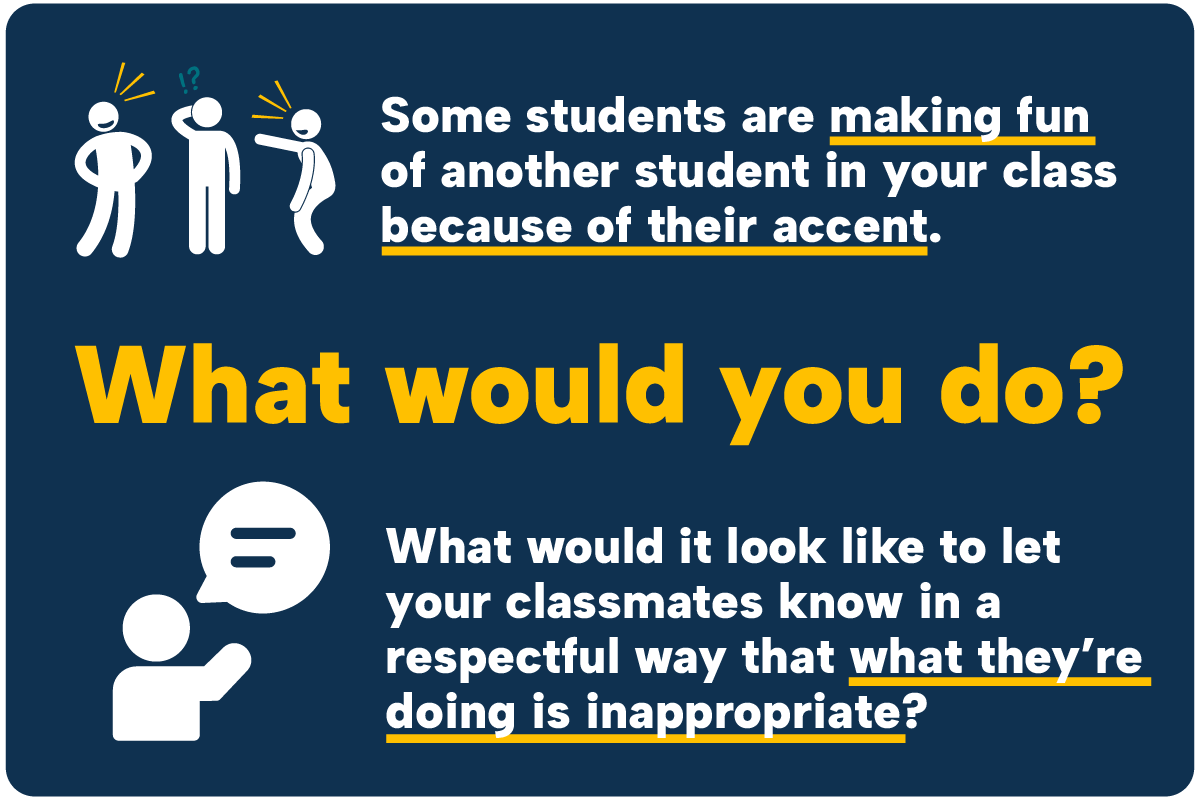Stop the Hate
National Conflict Resolution Center: Building Belonging in San Diego Schools

Elise* had often witnessed students with disabilities at her San Diego school being teased or bullied. She has a sibling with a disability and was deeply troubled by these incidents but felt helpless to intervene without getting bullied herself. All this changed when trainers with the National Conflict Resolution Center (NCRC) visited her school with a new program called Building Belonging. During an in-class, interactive training, Elise had the chance to learn four different strategies she could use right away to help her sibling and the other students who experienced bullying. After completing the program, she felt happy and confident that she had real-world tools to move from being a bystander to an “upstander” in a safe, effective way.
NCRC project manager Rachael Lewis has heard many stories like Elise’s. The organization’s newest school-based training series has empowered thousands of young people across San Diego to de-escalate difficult situations while building understanding and trust among peers. Lewis and the NCRC team have also seen the impact on youth when intolerance and hate go unaddressed in the school system. Absenteeism and behavioral issues become more frequent, while morale, student safety, and academic achievement suffer widely.
Shared Lewis, “If a student doesn’t feel like they belong or feel safe physically or emotionally, their academic performance is hindered. If they feel safe and have trust in others, they do better academically and have fewer behavioral challenges. We know that from talking with many schools.”
An evolving focus on prevention
A nonprofit nationally recognized for its conflict resolution work among adult populations, NCRC is known for training and mediation services that promote effective communication practices in workplaces and other community settings. But for the past decade, the organization has been honing youth-focused collaborations across San Diego County, including juvenile justice reform initiatives and restorative school programs.
Designed as alternatives to suspension or incarceration, these programs are employed in situations where a youth causes harm to another person. Participants collaborate to ensure the young person is held accountable for their actions and works to repair the harm done, while also keeping them in community and out of the school-to-prison pipeline. While these models proved highly effective as follow-up to harmful behaviors, the NCRC team recognized there was an opportunity to engage youth in harm prevention.
“We soon learned the value of preventing the spread of hate before incidents could occur,” shared Lewis. “We knew working with adults had impact, but we also knew how hard it was to change adult perspectives. We wanted to expand our work with youth, who are still forming connections and thought processes about how they treat their fellow youth as they move through the world.”
Equipping youth with skills to speak up and intervene against hate
When the California Department of Social Services rolled out Stop the Hate, a statewide funding program designed to counter the conditions that lead to hate crimes in local communities, NCRC leaders finally had the opportunity to pursue this preventative approach. Leveraging expertise in conflict navigation and youth engagement, the organization developed a suite of trainings to target the root causes of hate among youth and shift schools toward a culture of tolerance and belonging.
The Building Belonging curriculum includes eight sub-programs tailored to students in sixth through twelfth grade as well as teachers, school administrators, and parents. In trainings such as The Art of Inclusive Communication and The Bystander Challenge, participants learn to recognize and respond to “red flag behaviors.” This might include bullying or harassment on the bus, in the cafeteria, as part of a sports team, or other scenarios where youth might typically witness or experience hate.
Participants are also given opportunities to practice the communication and intervention strategies they learn. The facilitator may pose a scenario like this:
Some students are making fun of another student in your class because of their accent. What would you do? What would it look like to let your classmates know in a respectful way that what they’re doing is inappropriate?

By brainstorming and acting out potential responses, youth gain confidence in their ability to intervene when challenging situations arise in their own lives. And while each training is tailored to specific age groups and circumstances, all Building Belonging programs underscore NCRC’s signature work: equipping people with the skills to forge connections, build empathy, and strengthen problem-solving skills while engaging respectfully with individuals of different identities and cultures.
Shifting school culture toward tolerance and belonging
NCRC has rolled out Building Belonging across nine San Diego County school districts where schools have directly requested support—tailoring its approach with individual schools to address specific ways in which hate has affected culture, student safety, and performance. In 2024 and 2025 alone, NCRC facilitated an impressive 173 sessions and trained 3,370 participants — ranging from middle school to high school students as well as staff, teachers, district leaders, community members, and parents.
Beyond the numbers, the impact of NCRC’s Building Belonging series in San Diego County schools has been profound. Young people, teachers, school administrators, and parents are equipped with tools to navigate difficult conversations and find common ground. They know how to speak up when they observe or experience discriminatory treatment. They embrace tolerance and respect for others as the norm and reject hate as unacceptable.
Amid the nationwide rise of a culture of disrespect and increasingly polarized communities, this is no small accomplishment. NCRC’s work to instill a sense of belonging for all has changed the trajectory for thousands of students and their families across the San Diego region. But Lewis and the NCRC team recognize that the need for prevention-focused youth engagement will continue: “Students and the adults who care about them are hungry for connections like this and for opportunities to share, reflect on, and understand the challenging situations in which they find themselves.”
National Conflict Resolution Center (NCRC) is a grantee partner of the statewide Stop the Hate program, funded through the California Department of Social Services. Catalyst of San Diego & Imperial Counties serves as the regional lead for grantees across the Southern California Border Region. Learn more about NCRC and other San Diego and Imperial County-based nonprofits working to stop the hate at catalystsd.org/stopthehate.
*Name changed to protect anonymity of youth participant.